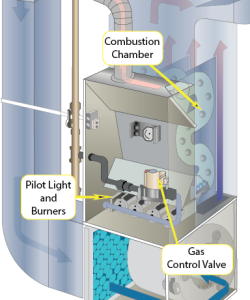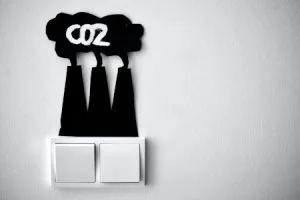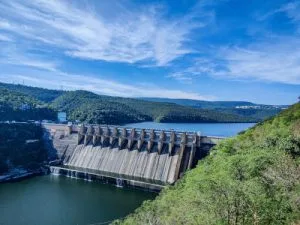Electric or Gas Furnace: What's Better? (Pros and Cons)
How do you know your furnace is right for you? Every person has different needs. So having a furnace that can handle your heating needs is critical to your home comfort. It might even be essential to your safety if you live in an area where the temperature drops below freezing in the winters. Natural gas is the most prevalent form of heating, but electric furnaces are also being used more frequently. So how do you know if you would be better off with an electric or gas furnace?
Well, like a lot of things – it depends.
If you want to go green and reduce fossil fuel consumption, then you would see value in using an electric furnace.
If you want to heat your home for a lower utility cost, then you can find those savings in a gas furnace.
Of course, there is always more nuance to the decision.
In this post, we’ll go over the pros and cons of each. In the end, we’ll also describe the uses for each type of furnace. By the end, we hope you can make a confident and informed decision about how to handle your home heating.
What Is the Big Difference Between Electric and Gas Furnaces?
The most significant difference between electric and gas furnaces is how they make heat. An electric furnace uses electricity, while a gas furnace uses natural gases. This means that they each have different parts inside them and that they use different processes to make heat.
Mechanical Parts
A gas furnace has a few essential parts that are not found in an electrical furnace.
- Pilot Light and Burners
- Gas Valve
- Combustion Chamber

Those parts are comparable to the electronic furnace’s heating coils.
Those unique parts allow the furnace to create heat.
There are, of course, more parts unique to each furnace type, but they perform similar duties. These are safety switches and controllers that make sure your furnace is working correctly and safely. That’s important for any kind of heating equipment.
How Heat Is Made from Gas
A gas furnace creates heat by pulling natural gases from the gas main through the gas valve. From the valve, this gas flows into the combustion chamber. There it is then ignited by the pilot light and burners. Next, the heat is safely pulled from the burning gases by the heat exchanger. From there, the heat is pumped into your home.
How Heat Is Made from Electricity
An electric furnace makes heat by pulling air into its heat exchanger. There, heating coils turn on and warm the air. Once it detects that the air is at the correct temperature, a fan turns on and pumps it into your home. It works a lot like a toaster oven. Only instead of tasty pastries, it’s cozy air.
Differences in Cost
So now we know what the mechanical differences between furnaces are. What’s the difference in price between an electric and gas furnace?
Like with a lot of things in HVAC, we have to look at both the initial cost to install it and the long-term cost to run it.

Install
For installing the furnace, the electric furnace will typically be less expensive. However, the actual cost will vary based on your installing contractor. For example, a performance-based company installing a high-end electric furnace could cost only a little less than that same company installing a high-end gas furnace.
Long-Term Use
The cost of operating a gas furnace is going to be less than the cost of using an electric furnace.
Over recent years, the cost of electricity has gone up. Meanwhile, the price of natural gas has gone down.
An electric furnace uses electricity to turn on and create heat. So it uses the more expensive resource for the entire time that it’s running.
A gas furnace uses electricity to turn on, but it uses natural gas to generate heat. That means that you will spend less on energy and utilities to operate a gas furnace.
If you want to offset that cost, then you could install a heat pump besides your electric furnace. The heat pump will heat your home with less energy usage during the mild months, and the electric furnace will provide that extra heat to keep your house warm in winter. The heat pump will also add a cooling element to your HVAC system, potentially removing the need for a separate AC unit.
Safety
Safety is a point of concern for every household. You want to be sure that you live in an environment that will not put you at risk.
Both gas and electric furnaces are safe in a vast majority of cases. They usually only pose a risk if something has gone catastrophically wrong. If your furnace is being maintained and serviced correctly, then your risk of danger is going to be significantly reduced.
Carbon Monoxide
Electronic furnaces have the edge over gas furnaces with chemical emissions. Gas furnaces produce carbon monoxide, whereas electric furnaces do not. That being said, if your gas furnace is being serviced regularly, you will limit the chances of a leak developing.
If you have a gas furnace, keep a carbon monoxide detector in your home. Make sure it is always on and test it often. The manufacturer of the detector will have instructions on how to test your equipment.

Home Heating
Obviously, we buy a furnace to keep us warm at home. So, what will heat your home better, an electric or gas furnace?
Heating Power
A gas furnace can heat air faster than an electric furnace. That means that it will heat your home quicker than an electric furnace. The difference becomes more apparent in cold weather. An electric furnace will take a little longer to catch up. In the end, they should both get your home to the desired temperature.
Heating Efficiency
An electric furnace will be more efficient than a gas furnace in just the raw numbers. This is because 100% of the energy it uses turns into heating for your home and does not create any byproducts. That being said, it still uses more energy than the gas furnace because it works for a longer amount of time. In addition, the energy it uses is more expensive than the fuel a gas furnace uses.
A gas furnace uses less energy overall because it heats the air quicker and runs for a shorter amount of time.
All that means is that the gas furnace is more efficient in a practical sense. Looking at things like time and money.
Impact of Gas Vs. Electricity
Now we’ll take a look at what kind of furnace has a more significant environmental impact. Obviously, a gas furnace uses natural gases, while an electric furnace only uses electricity. First, however, we have to look at how that electricity is created.
How Does Region Impact Energy Cleanliness?
Electric furnaces have zero carbon emissions on their own. However, they are reliant on the state power grid.
Different regions use different sources of energy. For example, in Oregon, over 1/3rd of our energy comes from hydropower (water dams and turbines). However, that is not the case for a state like Arkansas.
Each type of energy source has its own efficiency rating. For instance, coal has an average efficiency of 40%. That means that 40% of the energy released by burning coal becomes electricity, and the remaining 60% gets lost forever. Coal also releases more byproducts than natural gas or renewable sources.

A 90% efficient gas furnace will have less impact on the environment than an electric furnace in a region that gets its power from low-efficiency or dirty sources.
Suppose the state or region gets most of its power from a clean source. In that case, the electric furnace will be more eco-friendly. For instance, if you live in our market of Oregon, then you probably get most of your energy from hydropower.
If going green is something that you are passionate about, then you are probably familiar with how your state generates its energy. Take that into consideration when deciding if you want to be more reliant on the energy grid or the gas main.
If your home is entirely solar powered, then you will have zero emissions or reliance on coal with an electric furnace.
Durability
Electric furnaces tend to be more durable and require fewer repairs than gas furnaces.
An electric furnace has an expected lifetime of 20-30 years. This is because it also does not have to deal with the same wear and tear as gas furnaces. An electric furnace will have fewer moving parts that could break. That means that electric furnaces can expect fewer repairs than gas furnaces during their lifetime.
A gas furnace has an expected lifetime of 15-20 years. It also has more potential points of failure than an electric furnace. However, proper maintenance can reduce the risk of equipment failure and prevent breakdowns.
Gas Furnace Pros and Cons
Pros
- Cheaper Operating Cost
- Quicker to Heat Up
Cons
- Creates Emissions
- Requires Carbon Monoxide Detector

Electric Furnace Pros and Cons
Pros
- Cheaper to Install
- No Byproducts or Emissions
Cons
- Much More Expensive Without a Heat Pump
- Slower to Heat Up
Electric or Gas Furnace: They Each Have Their Uses
The climate that you live in and your home heating needs will determine what type of furnace is the best fit for you.
If you live in a hot and dry climate and only need to use your furnace a few days out of the year, then you may want an electric furnace. It should have no trouble keeping your house warm during mild winters, and you may not use it enough to offset the initial savings during the installation.
If you live in an area that experiences cold winters as we do in the Willamette Valley. Then a gas furnace is recommended. You will want something that can keep your house warm and won’t break the bank with an energy bill.
Who Are Advantage Heating and Air Conditioning?
We are your local HVAC Experts out of Salem, Oregon. We hope this post gave you the information you need to know what kind of furnace is the best fit for you. If you have other questions about HVAC systems, check out our other blogs. To learn more about who we are and how we can help you, visit our website and follow us on social media – we’re here when you need us!







